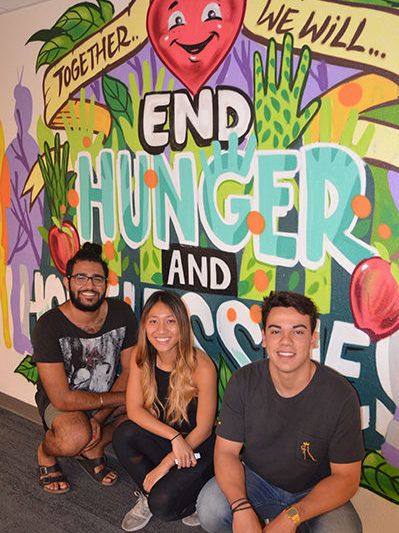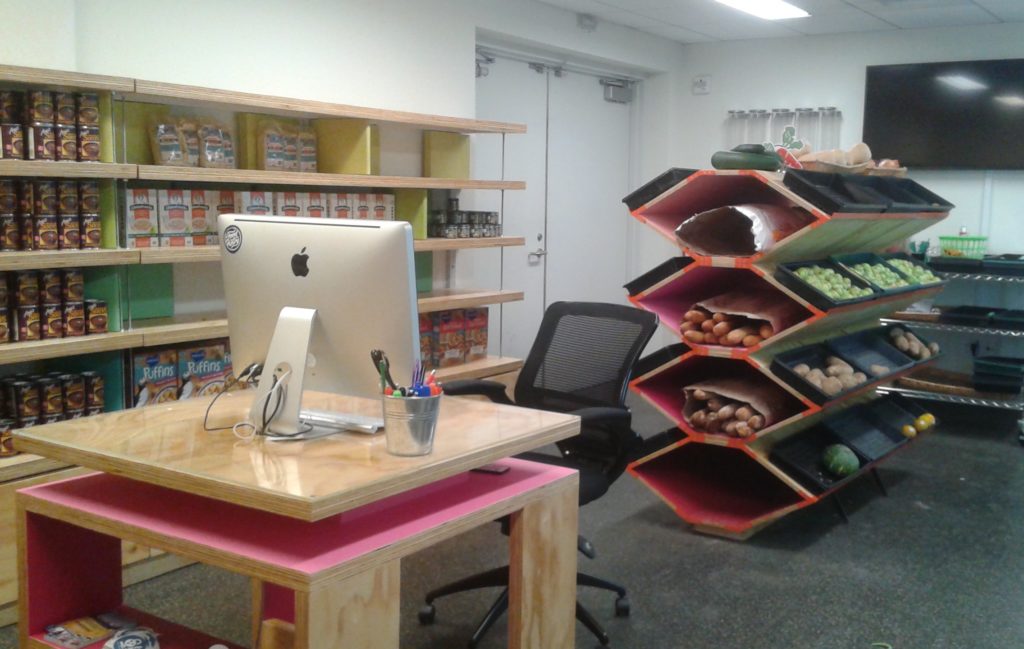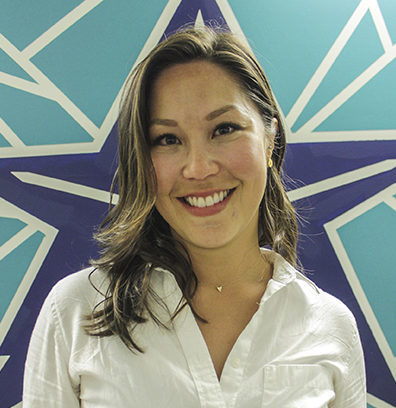 December 12, 2018
December 12, 2018
By Meg Prier
Meg Prier is Basic Needs Food Manager at the Berkeley Food Institute and member of the Basic Needs Committee Staff Leadership team.
From the beginning, Basic Needs efforts and advocacy at UC Berkeley have been student initiated and led. We define “basic needs” as food, housing, and financial security. Since the UC Berkeley Food Pantry first opened in 2014, efforts have developed into a full campuswide preventative model for food, housing, and economic justice. As the nature of our work has grown and evolved, student leadership has remained central to the mission and coordination of services.

From left, Basic Needs student coordinators: Vikrem Padda, Stella Zhu, and Ibrahim Ramoul Menendez. Photo by Gretchen Kell.
Continued student advocacy led to collection and analysis of data on food and housing security to understand the scale of the need and bring attention to the issue at campus, regional, and national levels. A UC research team conducted several UC-wide studies, the latest of which is the largest of its kind in the country. It found that 44 percent of undergraduate students and 26 percent of graduate students across the UC system experience food insecurity. Food insecurity is defined by the USDA as a lack of food, in quality and quantity, due to insufficient financial resources. Five percent of students, undergraduate and graduate, were also found to experience homelessness or housing insecurity at some point during their college experience. At UC Berkeley, 39 percent undergraduates and 23 percent of graduate students experience food insecurity, and a recent study conducted by the Chancellor’s Housing Task Force found that ten percent of UC Berkeley students experience housing insecurity or homelessness. This is about 14,000 Berkeley students experiencing food insecurity and 3,800 experiencing housing insecurity. This study also analyzed food and housing insecurity across demographic groups and for intersecting identities. The highest level of food insecurity, 74 percent, was identified for students who are underrepresented minorities, LGBTQ, and independent (without family support).
Fundamental to our basic needs efforts is an understanding of the connection between food, housing, and financial wellness. We can not address any of these in isolation—people make financial decisions and tradeoffs between various basic needs when they have limited resources. Furthermore, it is important that we understand the systemic and structural reasons for basic needs insecurity. Hunger, malnourishment, homelessness, and poverty are national and global issues that are systemic in nature and not due to individual choices or lack of responsibility. Economic systems in the United States have exacerbated financial inequality in the last few decades, with fewer resources for social services and less economic mobility.1,2 There is growing income inequality with a shrinking middle class, and income is substantially different by race and class. For college students specifically, the full cost of attendance, including tuition, fees and living expenses, has significantly increased. While many public college students in the 1980s were able to work their way through college (working part time during the school year and full time in the summer), this is no longer possible: the same hours of work today covers only about one-third of the average cost of attendance for public institutions. 3,4 With insufficient financial aid, we are seeing high rates of basic needs, food and housing, insecurity among college students, especially among the growing enrollment of first generation and low income students.
While hunger is a universal challenge in our society, rates of food insecurity are significantly higher for college students. About 13 percent of people living in Alameda County experience food insecurity compared to the 39 percent of UC Berkeley students. 57 percent of UC students systemwide who face food insecurity while in college had never experienced it before. Conditions in their higher educational environment introduced food insecurity to their lives. These conditions include: insufficient financial aid, high housing prices, limited time to prepare food, limited or no access to a kitchen, and limited affordable prepared meals for sale on or near campus. The UC wide research study shows the negative impact of food and housing insecurity on student GPA, time to degree completion, and overall quality of student life.
The UC Berkeley Basic Needs Committee formed as a cross-campus collaboration between students, staff, faculty, and administration to coordinate an effective and preventative campus approach to basic needs security and justice. We aim to both address the root causes of basic needs insecurity through advocacy and systems change and to provide direct services to our campus community in need of support today.

Inside the UC Berkeley Food Pantry in the MLK, Jr. Student Union. Photo by Meg Prier.
Our primary food security support programs include the campus food pantry, CalFresh enrollment and the Food Assistance Program. Our food pantry has continually increased its operations and usage since launching in 2014. It is now open six days a week, serving over 6,700 students (22,000 visits) in the 2017-2018 academic year. The pantry is managed by two undergraduate student coordinators, Stella Zhu and Ibrahim Ramoul Menendez, who oversee six operational teams of 65 students overall: data and operations, undergraduate outreach, graduate outreach, nutrition and wellness, food recovery, and gleaning. A team of parent and community volunteers also help to keep the pantry operational during finals and semester breaks.
Our CalFresh team, coordinated by undergraduate student Vikrem Padda and including ten ambassadors and interns, conducts regular CalFresh enrollment clinics. Approximately 10,000 Berkeley students are eligible for CalFresh, and our goal is to enroll as many as possible. Students with work-study or Cal Grants, and members of the Educational Opportunity Program and Disabled Students Program are CalFresh-eligible since the program expansion to college students through passage of California Assembly Bills 1930 (2014), 1747 (2016), and 214 (2017)
In the 2017-18 year, our CalFresh team enrolled 1,300 students and aims to enroll 3,000 this academic year. We have also developed robust partnerships with Alameda County Social Services and the Alameda County Community Food Bank to support these efforts. The Food Assistance Program offers supplemental meals through Cal Dining for students who are not eligible for CalFresh but are in need of food support, including undocumented students.
Overall, we see our food pantry as an emergency intervention and CalFresh as a preventative, sustainable form of support. While we are committed to a pantry that is accessible and welcoming to everyone and to ensuring a high quality and diversity of food options, we aim to reduce the number of students in emergency and therefore the number that are reliant on the pantry. This is with the understanding that until we address systemic poverty and oppression we will continue to have students experiencing basic needs insecurity. It is also fundamentally important that our resources are accessible to everyone regardless of their intersecting identities. This initiated the development of the Food Assistance Program to offer comparable support for those who are not eligible for CalFresh.
With cross-campus advocacy, this fall we are in the process of expanding our food security services to campus staff in need. We started by opening our pantry to staff and bringing CalFresh enrollment clinics to staff who live in Alameda, Contra Costa and Solano counties.

Kiyoko Thomas, UC Berkeley’s new Basic Needs Manager. Photo by Jeremy Snowden.
In addition to these primary food security resources, we have numerous educational programs that include: an academic course in the Nutritional Sciences and Toxicology Department (NST 20) that builds cooking skills; regular cooking and nutrition demos through University Health Services with food from the pantry; and collaboration with the student run course “Food for Thought,” which teaches about food justice concepts and practical food preparation and cooking skills. Campus farms and gardens offer experiential learning opportunities in growing food and regularly donate harvested produce to the food pantry. The Basic Needs Committee has also led efforts to coordinate food recovery across campus, initiated a gleaning program, and is supporting the Student Kitchen Project to establish a student-run retail space on campus to sell repurposed food waste as sliding scale meals.
Food security programs were our first efforts to address campus Basic Needs, and we are now building our housing and financial justice services. This fall we hired a Basic Needs Manager, Kiyoko Thomas, who provides staff leadership for a housing protocol and case management. In spring 2019, we will open a Basic Needs Center in the lower level of MLK, Jr. Student Union next to the Food Pantry. This accomplishment speaks to the incredible efforts of our student and staff leaders, and we are excited to welcome our community into a physical space that can offer a variety of expanded support and services.
Citations:
1 Piketty, Thomas and Saez, Emmanuel. “How Progressive is the U.S. Federal Tax System? A Historical and International Perspective,” Public Economics, 2006: NBER Working Paper No. 12404.
2 Saez, Emmanuel and Zucman, Gabriel. “Wealth Inequality in the United States Since 1913: Evidence from Capitalized Income Tax Data,” National Bureau of Economic Research, 2014: Working Paper 20625.
3 Hinrichs, Peter, 2016a. “Trends in Employment at US Colleges and Universities, 1987–2013,” Federal Reserve Bank of Cleveland, Economic Commentary, 2016-05.
4 Hinrichs, Peter, 2016b. “Trends in Expenditures by US Colleges and Universities, 1987–2013,” Federal Reserve Bank of Cleveland, Economic Commentary, 2016-10.